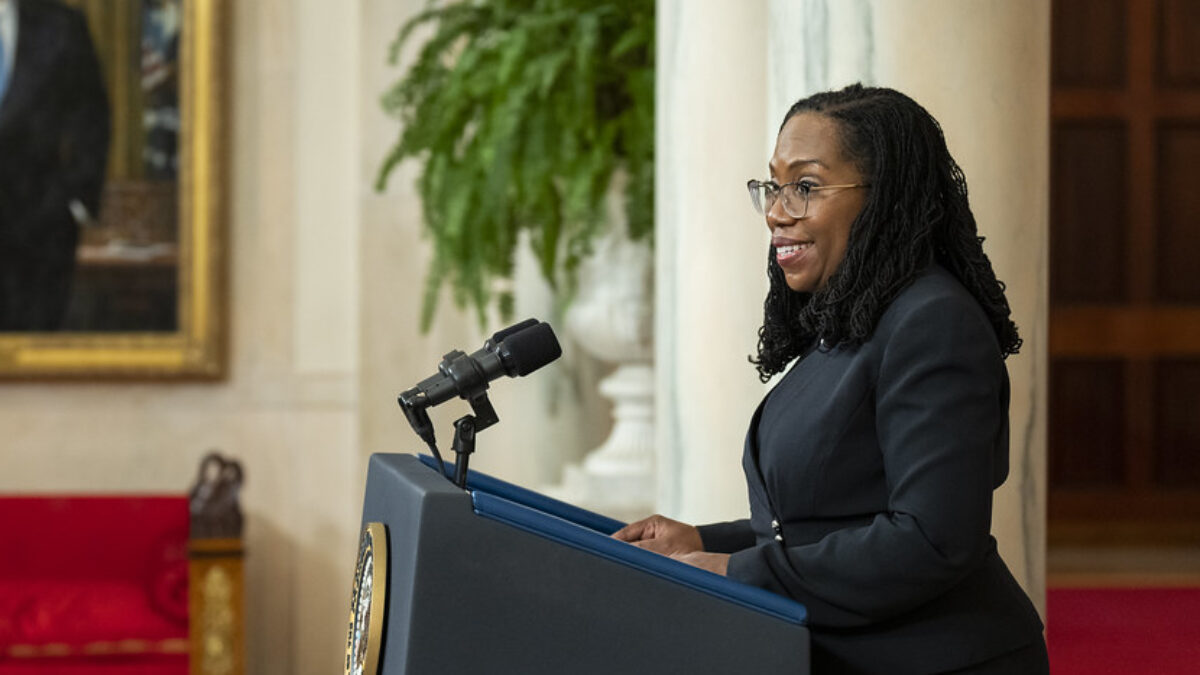Joe Biden’s recent Supreme Court nominee Judge Ketanji Brown Jackson, whom the president has admitted was nominated in part because she is a woman, stunned listeners on Tuesday when she refused to give a definition of what a woman is.
“I can’t. … I’m not a biologist,” Jackson said after Republican Sen. Marsha Blackburn asked her to provide a definition of the word “woman.”
But for not knowing what a “woman” is, Jackson loves to use the word. Here are 14 times she invokes the fairer sex in just the first two days of her confirmation hearings, plus 34 times she’s used the word in her legal opinions as a judge (emphasis ours).
KBJ Referenced Women 14 Times in First Two Days of Hearings
In her opening statement on day one of her confirmation hearings, Jackson opined that “I stand on the shoulders of so many who have come before me, including Judge Constance Baker Motley, who was the first African-American woman to be appointed to the bench.”
On day two, Jackson couldn’t talk about the Supreme Court’s precedent on abortion without referencing women.
“Roe and Casey are the settled law of the Supreme Court concerning the right to terminate a woman’s pregnancy,” she said.
“After Casey, the court has determined not so much that the right to terminate a woman’s pregnancy is fundamental,” she continued. “The right exists and it’s subject to the framework in Casey that allows for regulation.”
She also mentioned a female witness in a case related to child sex crimes, an area of law where she has been accused of handing down light sentences to child pornography offenders.
“I somehow still have nightmares about the main witness, the woman I mentioned earlier,” Jackson said, demonstrating her ability to identify the woman’s sex.
She’s also invoked the concept of womanhood to pat herself on the back for being nominated.
“I am humbled and honored to have the opportunity to serve in this capacity and to be the first and only black woman to serve on the United States Supreme Court,” she said.
And again: “Because I am a woman, because I am a black woman, all of those things people have said have been really meaningful to them.”
Yet again: “Having meaningful numbers of women and people of color, I think matters.”
And then three times in the same sentence: “I gave a speech about black women in the civil rights movement, most of the speech if not all of the speech was focused on African American women, their contributions to the civil rights movement, unsung contributions in many cases, and then some of the more recent African American women who have made claims, who have done things in our society.”
She even acknowledged not just the existence of women, but the existence of men. “We believe that we have a government of laws and not men,” she told senators. “And yet there are men and women who are acting as judges in the context of our system.”
When she spoke of her own motherhood and her own daughters, she tacitly admitted the strong connection that the telos of motherhood has to womanhood. “I know so many young women, in this country especially, who have small kids who have these momentous events and have to make a choice,” she said of balancing career obligations with children’s schedules.
And after Blackburn questioned Jackson about an opinion she’d signed referring to pro-lifers as “a hostile, noisy crowd of ‘in-your-face’ protesters,” Jackson referred to “women who wanted to enter [abortion] clinics” in her response. That opinion made five more references to a “woman” or “women.”
But that’s not the only document in Jackson’s legal record where she used the terms “woman” and “women” and assumed there will be no confusion about what she meant.
34-Plus Mentions of ‘Woman’ or ‘Women’ in Judicial Opinions
In her opinion in the case Policy & Research, LLC v. U.S. Department of Health & Human Services, Jackson referenced “programs that seek to decrease the prevalence of teen pregnancy among eighteen- and nineteen-year-old African American and Latina women.”
She used the word “woman” four times and the word “women” twice in Azadeh v. Government of the Islamic Republic of Iran. In James v. United States, she wrote “woman” 11 times.
In City & County of San Francisco v. Azar, Jackson referred to “pregnant women,” “the relationship between physicians and women seeking the abortion,” “the obstacles women have in asserting their right to an abortion,” “women seeking abortions,” and “a woman seeking an emergency abortion,” in addition to stating that “women generally cannot safely secure abortions without the aid of physicians.”
In Garcia v. Roberts, she wrote about the “manner that bar admission rules in the nineteenth century unlawfully discriminated against women and African–American applicants.”
“Plaintiff Bukola Alibalogun (‘Alibalogun’) is a woman of African descent,” she said in Alibalogun v. First Coast Security Solutions, Inc.
She introduced a plaintiff similarly in Perry v. Colvin: “Plaintiff, Janell Perry, is a 46-year old woman residing in Washington, DC.”
In Beshir v. Jewell, she explained “Shirlean Beshir (‘Beshir’ or ‘Plaintiff’) is an African–American woman who was fifty-one years of age during the summer and fall of 2007.”
And in Austin-Spearman v. AARP & AARP Services Inc.: “Plaintiff Ethel Austin–Spearman is an internet savvy woman.”
Again, in Lawson v. Sessions: “Sheila Lawson is an African–American woman who began her employment as a Special Agent (‘SA’) with the FBI on October 15, 1995.”
In her description of plaintiff Geraldine Campfield in Campfield v. Commissioner of Social Security, Jackson wrote, “At the time of the alleged onset of her disability, Plaintiff was a 51-year-old woman.”
In United States v. Georgieff, she noted that defendant Jordan Georgieff had “married a second woman, Dariana Borisova,” while still married to his former wife.
Jackson repeatedly referred to “woman-owned small businesses” in her opinion in Rothe Development, Inc. v. Department of Defense.
In United States v. Hillie, a child pornography case, the judge wrote that “Charles Hillie (who was born in November of 1983) became romantically involved with a woman.”
Repeatedly using a word she says she “can’t” define is not a good look for a potential Supreme Court justice. Blackburn should ask Jackson: What did you mean by “woman” all of those times you said and wrote it?









